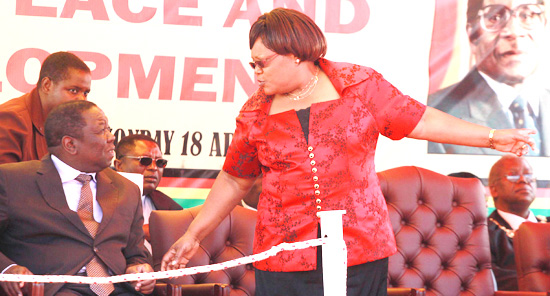
FOR close to two decades now, the Zimbabwean story continues to be one of penury, despondency, a national leadership given to profligacy and, worse, an opposition that places personalities above national interests.
guest column: LEARNMORE ZUZE
Nothing solid is yet to come out of the dithering coalition talks.
The late former Tanzanian President Julius Nyerere once described Zimbabwe as the “Jewel of Africa”, but today, this statement hardly describes the run-down country that Zimbabwe has become.
It’s undeniable that the country’s current unenviable situation cannot be divorced from the lop-sided policies and 36 years of rule associated with the governing party, Zanu PF.
Since the turn of the century, Zimbabweans have known hardship in every form.
The often scoffed at prospect of taking up menial jobs in foreign lands became a living reality in the early 2000s, as many joined the great trek to South Africa and the United Kingdom in the face of a free-falling economy.
- Chamisa under fire over US$120K donation
- Mavhunga puts DeMbare into Chibuku quarterfinals
- Pension funds bet on Cabora Bassa oilfields
- Councils defy govt fire tender directive
Keep Reading
Zimbabweans found themselves out of work; the Zimbabwean dollar began its unprecedented fall.
The default response by many was to exit the country. Many, like Chimurenga legend, Thomas Mapfumo, who had sworn by their totems that they would never leave Zimbabwe under any circumstance, found themselves flocking to foreign lands in the heat of the economic crisis.
Those who remained behind and braved hardship at the time were to follow in droves in the subsequent years.
Very few adult Zimbabweans would claim not to have stayed in a foreign country in the last 16 years owing to the economic disaster; it has been a gruelling decade-and-a-half all the way.
A reprieve for Zimbabweans probably came during the Government of National Unity (GNU) when the MDC formations, in their wisdom or lack thereof, made a pact with Zanu PF in what was largely seen as a marriage of convenience.
It was quite a sad miscalculation; for saving the situation, opposition MDC-T leader, Morgan Tsvangirai found himself a subject of ridicule by the very party he had saved from total collapse.
The situation just before the GNU had become awful.
Zanu PF hung by a thread; everything around the party was collapsing. It can safely be said that there was no economy to talk of in 2008.
Empty shops, outrageous inflation and fuel shortages had become the order of the country.
Foreign newspaper headlines screamed that the country’s economy had collapsed, and this was not an overstatement.
It was at the time that mediation efforts led by former South African President Thabo Mbeki gave birth to the GNU, largely seen as a wrong turn for the opposition, as it gave Zanu PF time to reflect and reinvent itself.
It is a widely shared view that it was actually the opposition that threw Zanu PF a lifeline.
Many contend that the opposition lost the plot when they got into bed with a moribund party.
And true to this analysis, the opposition has struggled to regain a foothold ever since.
For a party that has presided over a dying industry, collapsing health system, deplorable road infrastructure, deteriorating education system, among many other ills, Zanu PF has certainly done well for itself by winning the majority of by-elections although crude methods have always been employed in Zanu PF victories.
It is, indeed, a damning indictment on the opposition in Zimbabwe that they fail to upstage a crisis-torn party.
Today, Zanu PF faces what possibly threatens to be the worst implosion in recent times.
What, with the ugly internecine fights that have seen the brawling of party bigwigs.
The ruling party, though formidable, is manifestly torn because of factionalism.
Added to that, the economy itself has never taken off and maintained stability under Zanu PF rule, as it did during the GNU.
Retrenchments galore, shutting down of companies, vendor chaos and general maladministration are factors that have heavily militated against an out-of-sorts ruling party.
Now, while the ruling party faces all these potential disasters, we have an opposition that probably needs to be kicked in the shins to wake up.
Zimbabwe has an opposition that places egos above national interests.
The opposition has perceivably failed to exploit these glaring weaknesses to its benefit.
The opposition is not known for aggressiveness; as things stand, very few of its supporters are registered voters, yet they envision a 2018 victory.
Come 2018, we could probably witness an opposition crying foul, making rigging claims again.
Now, should be the time for the opposition to be exploring ways around a presidential election win.
That Zanu PF convincingly trounced the opposition in a recent by-election should speak to the opposition that Zanu PF’s internal problems do not necessarily translate into an opposition victory.
The opposition needs real strategy, whether it means forming a coalition for a common purpose.
By their indecisiveness and struggle for personal supremacy, the opposition in Zimbabwe has had a hand in prolonging the suffering of Zimbabweans.
While it is easier to savage Zanu PF for running down a once-vibrant economy, it is often overlooked that the opposition has faltered on many occasions to the detriment of the country.
The opposition needs a workable plan and concrete strategy to claim power from the ruling party.
Learnmore Zuze writes in his own capacity. E-mail: [email protected]












